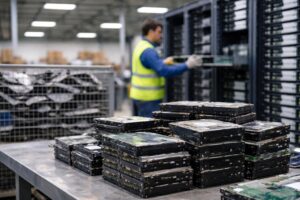The food and beverage industry is one of the most important interfaces for technology and sustainability. Furthermore, there is a rise in global demand for food while environmental concerns intensify. This is where IoT technology assumes a significant role in creating more sustainable food production systems. It is making a revolution in food production with less environmental impact. This is with smart sensors that monitor the health of the crops, an automatized system for energy use adjustment, and more. In addition, IoT solutions help in predictive maintenance and enable the adoption of data-based decisions. These are factors that help food producers reduce waste, conserve resources, and also lower their carbon footprint. So, this article delves into three main areas of IoT application in sustainable food production: smart monitoring and resource optimization, process automation and quality control, and supply chain integration and traceability.
IoT in Sustainable Food Production: Smart Monitoring and Resource Optimization
The optimal utilization of resources is the cornerstone of sustainable food production. In addition, there are new capabilities offered by IoT technology to manage and enhance the use of resources in real-time. Let us see this in-depth ahead:
Water Management Systems
Smart irrigation systems incorporate IoT sensors for active monitoring of soil moisture levels, weather conditions, and water demand by the vegetation. In addition, these systems apply water in real-time based on the received data. Thus, it reduces the risk of excess irrigation, and in turn, minimizes wastage of water. Advanced Water Management Systems based on IoT technologies can also locate and monitor sources of leaks, assess the quality of water, and analyze the patterns of its consumption as well. This can help food producers implement more sustainable water-saving practices and maintain ideal growing conditions.
Energy Consumption Tracking
IoT devices track energy usage across different production stages, from cultivation to processing. Furthermore, smart meters and sensors track equipment performance, detect energy-consuming processes and point in the direction of process optimization. Moreover, the system can automatically set operating parameters according to production needs, atmospheric conditions, and energy prices. So, this results in a substantial decrease in energy use and related carbon emissions. This is without compromising the efficiency of production.
Raw Material Monitoring
IoT sensors monitor inventory levels, storage conditions, and material quality in real time. Furthermore, sophisticated systems can forecast usage patterns, refine ordering schedules, and maintain the correct storage conditions to avoid spoiling. So, this comprehensive monitoring helps reduce waste, ensure quality consistency, and maintain optimal inventory levels. As a result, it contributes to both sustainability goals and operational efficiency. This is while reducing the environmental impact of excess production and waste.
Environmental Impact Assessment
The IoT-based systems for environmental monitoring are capable of measuring several areas. It includes greenhouse gas emissions, waste generation, and carbon emissions during the lifecycle of the product. In addition, the accumulation and evaluation of such data makes it possible to locate areas that require improvement and evaluate the effectiveness of sustainability practices. Moreover, the impact of IoT on food production efficiency is that it allows producers to keep detailed records of their environmental impact and prove their adherence to sustainability standards and regulations.
IoT in Sustainable Food Production: Process Automation and Quality Control
IoT technology enables complex automated processes. These optimize production processes while maintaining high-quality standards and reducing impact on the environment. So, let us some elements that help in achieving this:
Smart Production Lines
Smart manufacturing systems incorporate IoT devices for the monitoring as well as regulation of processes. Besides, these systems can also modulate the speed of production, and regulate the temperature and the resources consumed following the existing and future requirements. Moreover, smart production lines are equipped to identify and correct errors instantly. So, it reduces waste and energy use while ensuring product quality and homogeneity during production.
Predictive Maintenance
IoT sensors track asset performance and provide potential failure warnings long before they occur. Furthermore, patterns in operational parameters such as temperature, vibration, and others can be analyzed by these systems. This is to schedule service activities as needed. As a result, it avoids any unplanned downtime and energy waste stemming from equipment malfunction. In addition, this model of prevention can be turned into ensuring the longevity of the equipment and defining the peak performance leading not only to sustainability but effectiveness in operations as well.
Quality Assurance Monitoring
With the use of modern Internet of Things technology, it is possible to monitor product quality parameters at all stages of production. These systems can also collect temperature, humidity, pH, and other substantial indicators. It influences product quality and safety. Moreover, real-time monitoring enables on-the-spot corrective actions. So, the impact of IoT on food production efficiency is that it reduces waste from quality issues with the maintenance of food safety and legal regulations.
Waste Reduction Systems
IoT-based waste management systems monitor and process waste generation throughout the different stages of the food production process. Moreover, smart sensors monitor waste streams, detect waste sources, and offer data-driven advice for efforts to reduce waste. Additionally, these systems can optimize production planning to reduce excess production and implement effective recycling and composting programs. This will contribute to a circular economy.
IoT in Sustainable Food Production: Supply Chain Integration and Traceability
IoT technology opens an interconnected network across the food chain. This can allow greater coordination and transparency in sustainability practices. So, let us see how the technology achieves this through a few elements:
Real-time Logistics Tracking
Sensors track transportation conditions such as temperature, humidity, and location of food products along the supply chain. Furthermore, these systems guarantee the most ideal conditions may be obtained during the transport process. As a result, it minimizes food waste due to incorrect storage. Real-time tracking also allows for more optimized routing, load optimization, reduced transportation-induced emissions, and optimal preservation of product integrity.
Supply Chain Transparency
Blockchain-based IoT food tracking offers tamper-proof records at each level from farm to table. Furthermore, smart sensors record and monitor sustainability activities at all production and distribution stages. So, this transparency has the effect of allowing consumers to make reasoned decisions about sustainable products. It also enables the producers to track and verify sustainability compliance across the entire supply chain.
Inventory Optimization
Smart inventory management systems incorporate technologies such as sensors to track levels of stock, monitor the conditions of storage facilities, and predict changes in demand. In addition, these systems streamline order placement and storage flows to reduce both excessive stock and wastage. The real-time sight of inventory helps supply chain partners to coordinate more effectively. It minimizes the environmental impact of inappropriate handling of transport and storage.
Carbon Footprint Tracking
IoT-based carbon duct tracking systems measure emissions from the start to finish of the supply chain. These architectures also record information about energy consumption, transportation, and other emission sources. This is to depict the overall carbon footprint. Such monitoring enables organizations to map and deal with the most high-emitting areas and monitor the effectiveness of the measures aimed at reducing carbon emissions.
To Sum Up
The introduction of IoT in sustainable food production represents a critical change in the food industry toward more sustainable practices. Through real-time surveillance, automatic optimization, and exhaustive data analysis, IoT solutions are contributing to the sustainability goals of food producers. This is while simultaneously ensuring productivity and quality. Moreover, with the advancement of technology, the possibility of using IoT for greater advances in sustainable food production rises. However, realizing these benefits demands sustained investment in technology, infrastructure, and skills.
To get up-to-date insights into the latest innovations in sustainable food production technology and connect with the industry leaders, join the 3rd Net Zero Food & Beverage Forum in Berlin, Germany on 15-16 January 2025. This premier event will showcase strategies, case studies, panel discussions, and more for energy efficiency and decarbonization in the food and beverage industry. So, don’t miss out on this opportunity to get on board in the sustainable food production revolution!




